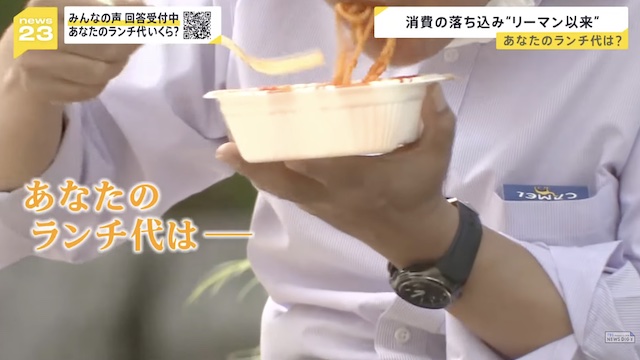TOKYO, May 17 (News On Japan) - Japanese workers are tightening their belts when it comes to expenditure on weekday lunches, as more people become conscious of saving money due to rising prices.

On May 16, it was announced that Japan's GDP (Gross Domestic Product) from January to March showed a decline in "private consumption" for four consecutive quarters, the first time since the Lehman Shock.
In a Tokyo park during lunchtime, people were asked how much they spend on lunch.
"I often buy lunch from a standing bar that sells lunch boxes for 650 yen. When I try to save, I aim to keep it within 500 yen."
"I bought an onigiri and cold Chinese noodles from a convenience store for 850 yen. It was quite expensive."
"Usually, I try to keep my lunch expenses to around 600 yen."
In response to ongoing price increases, people are making efforts to reduce costs, with workers spending on average 452 yen for a weekday lunch.
A woman said, "I often choose cheaper options like onigiri. The yen's depreciation affects prices, so it can't be helped."
One popular item among consumers is the larger portion meals offered by convenience stores, which keep the same price but increase the quantity by 25%.
A spokesperson from a convenience store chain said, "Starting this week, we began selling larger portion meals in the Chubu region at the same price. We planned this to offer customers more value and enjoyment despite rising prices."
A customer noted, "Getting more food for the same price is a great deal. It feels satisfying to eat more for less."
In another interview, a customer expressed, "With prices rising, having larger portions at the same price is a relief. You can definitely feel the impact of inflation when paying for essentials."
From January to March, Japan's GDP declined by an annualized 2.0%, with private consumption down for the fourth consecutive quarter, marking the first such decline since 2009 during the Lehman Shock.
A shopper at an electronics store commented, "Even phones are becoming more expensive. If I buy one, it will be a cheaper model, or I might not buy one at all."
Another shopper added, "Living with Japan's prices, if wages increase, things might change, but for now, it feels like we're at our limit with the current economic situation."
The government forecasts that employment and income will increase, leading to a gradual economic recovery. However, historical yen depreciation poses challenges for the Japanese economy.
"Many people are cutting back on expenses. It's difficult even to keep lunch costs within a coin's worth. Prices have gone up," one customer remarked.
Through the News Dig app, we surveyed users about their average lunch spending. The most common response was 400-600 yen, with 23.3% of respondents aiming to keep costs around one coin (500 yen). Another 17.9% reported bringing their own lunch.
Economist Mr. Katayama explained, "GDP is essentially the nation's earnings, with private consumption accounting for 60%. It's a crucial indicator, and the four consecutive quarters of decline are concerning, significantly falling short of economists' predictions. This is a clear result of increased savings due to higher prices driven by the yen's depreciation."
Survey results also indicate reduced spending on non-essential items, such as books, down 5.8%, and noodles, down 5%, reflecting a cautious consumer mindset. "The mood of 'don't spend' persists, influenced by a fear of insufficient government support since the bubble burst," noted an analyst.
Efforts to provide hope and positive news continue, but educational costs have also decreased by over 10%, indicating financial strain on households. "Raising wages could help increase consumption," the analyst added.
The government predicts that consumption will eventually rebound with tax cuts and wage increases. However, sustained economic growth remains uncertain, and strategies for finding happiness within current limits are needed.
"The notion of constant growth might be an illusion. It's important to seek fulfillment within modest means rather than constantly striving for growth," concluded Mr. Katayama.
Source: TBS















